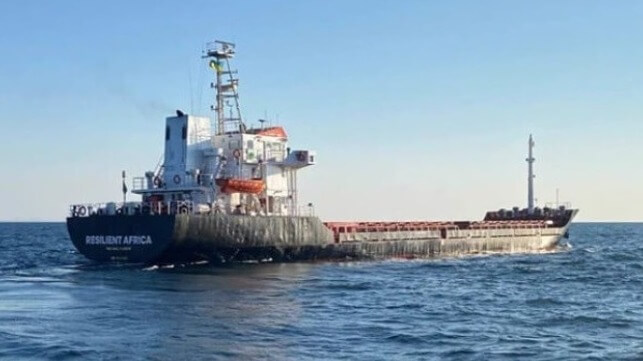The Repercussions of the Ukraine Conflict for Shipping and Insurance

 The prolonged war between Ukraine and Russia has impacted the shipping industry with substantial disruptions in maritime trade routes, leading to an alteration in shipping patterns and fluctuations in shipping companies' earnings.
The prolonged war between Ukraine and Russia has impacted the shipping industry with substantial disruptions in maritime trade routes, leading to an alteration in shipping patterns and fluctuations in shipping companies' earnings.
The Black Sea and its strategic importance
The Black Sea is of considerable significance in international trade, serving as a crucial waterway for ships transporting goods between Europe and Asia. The Ukraine-Russia conflict has elevated the geopolitical importance of this region, causing intensified scrutiny and augmented military presence, thereby impacting the freedom of navigation and escalating operational risks for shipping companies.
The increased tensions have necessitated the rerouting of ships, leading to extended transit times and elevated operational costs. This change has placed additional financial burdens on shipping companies, impacting their profitability.
Impact on Commodity Markets and vessels employment
This geopolitical unrest has caused disruptions in the supply of essential commodities like grain and oil. Ukraine is a major producer-exporter of grain via Black Sea, and any impediment in its shipping corridors leads to significant supply-chain disruptions and price volatility in global commodity markets, affecting both producers and consumers.
Last July Russia suspended – not for the first time - an agreed U.N brokered deal for Ukrainian grain exports as Russian commercial ships in the grain corridors have been hit by Ukrainian drones, as well as a minesweeping ship, jeopardizing thus even further Ukrainian grain exports. To understand the gravity of this it’s worth to mention that according to the European Commission, Ukraine accounts for 10% of the world’s wheat market, 15% of the corn market, and 13% of the barley market. With more than 50% of world trade, it is also the main player on the sunflower oil market.
A major exporter like Ukraine dropping out can have serious implications for global food security. The three main grain importers of Ukrainian grain were in 2020: Egypt (US$ 5.2 billion), China (US$ 3.4 billion) and Turkey (US$ 2.4 billion). Trade disruption in Ukrainian agriproducts exports cause shipping companies earnings to be seriously affected.
Marine war insurance and operational costs
The precariousness in the region has elevated the risk profile of shipping operations, resulting in increased war risk insurance premiums for vessels operating in or passing through the Black Sea. The elevated operational risks and insurance costs are substantial considerations for shipping companies when estimating a vessel’s hire or freight. The Insurers have received half a billion dollars in claims for up to 60 commercial ships which were stuck/blocked in Ukraine a year after the start of the war with Russia, industry sources told Reuters last February.
Per marine insurance policies, ship owners can claim a total loss for vessels stuck for a year, so long as they have maintained cover and policy in force by paying the insurance premiums, which have soared due to the war. With the Black Sea already listed as a high risk zone by the London insurance market, additional war risk insurance premiums of tens of thousands of dollars a day are common costs now alongside bunkers and freight.
International Sanctions and Insurance
The imposition of international sanctions on Russia has further complicated the situation. Sanctions targeting sectors like energy, finance, and defense have led to constraints in trade with Russia, impacting the volume of goods transported, and subsequently, the revenues of shipping companies, marine insurance underwriters and brokers alike. The sanctions' bureaucratic formalities have added an extra layer of complexity and economic burden for these parties.
Ensuring compliance with these sanctions is paramount to avoid legal repercussions, and insurers are meticulously scrutinizing the vessels, their ownership structures, and the nature of cargoes to avoid breaching sanctions, leading to rigorous underwriting processes and selective policy approvals.
The increased risks and operational disruptions in the region have resulted in an escalation in insurance claims, impacting the loss ratios of marine underwriters who are revisiting their loss adjustment practices and claim management strategies to effectively address the surge in claims and maintain financial stability, which is essential for maintaining good status and credibility.
Strategic Responses
Shipping companies are increasingly relying on strategic intelligence and risk management practices to navigate through the unstable geopolitical landscapes and safeguard their operations and revenues from the uncertainties brought about by the conflict, by being proactive, armoring their finances with tailor made, well thought through and structured marine insurance policies.
Let’s not forget that where there is conflict, there can be opportunity, and with good preparation the reward is worth the risk.
Conclusion
The Ukraine-Russia conflict underscores the deeply intertwined nature of geopolitics and the marine insurance industry. As the situation evolves, marine insurers need to remain agile, continuously re-evaluating risk profiles, adjusting premiums, and taking risks, enabling sea trade in the area. Collaboration with shipowners, clear communication, and proactive risk management strategies will be crucial in navigating these uncertain waters.

that matters most
Get the latest maritime news delivered to your inbox daily.
In parallel, politicians and diplomats must work hard in finding diplomatic solutions to stop the war. Otherwise, the world could be facing the biggest food crisis in decades, as the United Nations has warned.
Mr. Anastasios Maraslis is the founder of Marasco Marine, which has 32 years of experience in managing marine risks for shipowners, ship managers and ship operators.
The opinions expressed herein are the author's and not necessarily those of The Maritime Executive.
